FIRST ROUND THE WORLD TOUR (1519-1522)
DOI:
https://doi.org/10.51743/cih.84Keywords:
sphericity of the earth, portuguese route, Columbus, Vasco Núñez de Balboa, Magallanes, Elcano, UrdanetaAbstract
The First Tour of the World, the greatest seafaring feat in history, wich is now 500 years old, had a gestation that goes back to the Columbus project to reach the Far East by sailing in the opposite direction and taking advantage of the already planned old sphericity of the Earth, even if it failed to establish its correct dimensions. Insisting on that idea after the accidental discovery of America, especially after new discoveries such as that of Vasco Núñez de Balboa, they undertook the task of crossing the new and more extensive ocean. The project of Magallanes was even more precise and limited: to arrive at the islands of the spices by another way of initiated by Portugal, which provoked the animosity of the neighboring kingdom that had begun its explorations by a more traditional route, contouring Africa and arriving at the Indian Ocean and the Far East. Magellan died before reaching its goal, the decision of the circumnavigation of the planet was Elcano's decision. And the crucial "tornaviaje" fruit of the contribution of Urdaneta.
Downloads
Global Statistics ℹ️
|
880
Views
|
599
Downloads
|
|
1479
Total
|
|
References
Bartolomé Leonardo de ARGENSOLA, Conquista de las islas Malucas, Madrid, Miraguano Ediciones-Ediciones Polifemo, Biblioteca de Viajeros hispánicos, 1992.
José ARTECHE, Elcano, Madrid, Espasa-Calpe, 1942.
José ARTECHE, Urdaneta, Madrid, Espasa-Calpe, 1943.
Lourdes DIAZ TRECHUELO, “El Tratado de Tordesillas y su proyección en elPacifico”, Revista de Estudios del Pacifico, UCM, Madrid, nº 4, 1994.
Felipe FERNÁNDEZ ARMESTO, Colón, Madrid, Biblioteca ABC, protagonistas de la Historia, 1991, prólogo de Hugh Thomas.
Martín FERNÁNDEZ DE NAVARRETE, Colección de los Viajes y Descubrimientos que hicieron por mar los españoles desde fines del siglo XV, Madrid, Tomos IV y V, Imprenta Nacional, 1837.
Gonzalo FERNÁNDEZ DE OVIEDO, Historia general y natural de las Indias, Madrid, Biblioteca de Auotres Españoles, 1959.
Cesáreo FERNÁNDEZ DURO, Armada Española, desde la unión de los reinos de Castilla y Aragón, Madrid, Editorial Naval, 1973, tomos I y II.
Cesáreo FERNÁNDEZ DURO, La Marina de Castilla, Madrid, Instituto de Estudios Zamoranos, 1995.
Harry KELSEY, Sir Francis Drake. El pirata de la Reina, Barcelona, Ariel, 2002.
Robert LANGDON, The lost caravel, Canberra, 1975 y 1988.
Juan MANZANO MANZANO, Colón y su secreto, Madrid, Ediciones Cultura Hispánica, 1989.
José Manuel NÚÑEZ DE LA FUENTE, Diario de Magallanes. El hombre que lo vio y anduvo todo, Aranjuez (Madrid), Ediciones Doce Calles,2017.
José María PEDREÑO, José Maria: “Estudio Histórico-Jurídico de la Expedición de García Jofre de Loaisa a las islas Molucas. La venta de los derechos sobre dichas islas a Portugal por Carlos I de España”, Anales de Derecho, Universidad de Murcia, nº 21, pp. 217-237.
Antonio PIGAFETTA, Primer viaje alrededor del Globo (la crónica en vivo de la expedición Magallanes-Elcano, 1519-1522), Sevilla, Fundación CIVILITER, 2012.
Agustín Ramón RODRÍGUEZ GONZÁLEZ, En la estela de Colón. Carabelas y singladuras del Capitán Etayo, (sobre textos de Carlos Etayo Elizondo) Madrid, Actas,1998.
Agustín Ramón RODRÍGUEZ GONZÁLEZ, La Primera Vuelta al Mundo, 1519-1522, Madrid, EDAF, 2018. DOI: https://doi.org/10.51743/cih.84
Agustín Ramón RODRÍGUEZ GONZÁLEZ, Mitos desvelados: Drake y la “Invencible, Madrid, Sekotia, 2011.
Carlos MARTÍNEZ SHAW (coord). El Pacífico español, de Magallanes a Malaspina, Madrid, Ministerio de Asuntos Exteriores, Comisión del V Centenario del Descubrimiento de América, Comisión del Bicentenario de Carlos III, Lunwerg Editores, 1988.
Pedro GINER LARA y Mariano JUAN FERRAGUT (coords) El galeón de Manila. La ruta española que unió tres continentes. Madrid, Ministerio de Defensa, Imprenta del MINISDEF, Madrid, 2016. ditores.
VV.AA. CUADERNOS MONOGRÁFICOS DEL INSTITUTO DE HISTORIA Y LA PRIMERA VUELTA AL MUNDO 137 CULTURA NAVAL. Armada Española, servicio de publicaciones. Nº 35, Juan de la Cosa, Madrid, 2000.
VV.AA. CUADERNOS MONOGRÁFICOS DEL INSTITUTO DE HISTORIA Y LA PRIMERA VUELTA AL MUNDO 137 CULTURA NAVAL. Armada Española, servicio de publicaciones. Nº 39, La Casa de Contratación de Sevilla, aproximación a un centenario (1503-2003), Madrid, 2001.
VV.AA. CUADERNOS MONOGRÁFICOS DEL INSTITUTO DE HISTORIA Y LA PRIMERA VUELTA AL MUNDO 137 CULTURA NAVAL. Armada Española, servicio de publicaciones. Nº 50, V Centenario del fallecimiento de Cristóbal Colón, Madrid, 2006.
VV.AA. CUADERNOS MONOGRÁFICOS DEL INSTITUTO DE HISTORIA Y LA PRIMERA VUELTA AL MUNDO 137 CULTURA NAVAL. Armada Española, servicio de publicaciones. Nº 53, Vicente Yáñez Pinzón y la carabela San Benito, Madrid, 2007.
VV.AA. CUADERNOS MONOGRÁFICOS DEL INSTITUTO DE HISTORIA Y LA PRIMERA VUELTA AL MUNDO 137 CULTURA NAVAL. Armada Española, servicio de publicaciones. Nº 58, V Centenario del nacimiento de Andrés de Urdaneta, Madrid, 2009.
VV.AA. CUADERNOS MONOGRÁFICOS DEL INSTITUTO DE HISTORIA Y LA PRIMERA VUELTA AL MUNDO 137 CULTURA NAVAL. Armada Española, servicio de publicaciones. Nº 66, España en Filipinas, Madrid, 2012.
VV.AA. CUADERNOS MONOGRÁFICOS DEL INSTITUTO DE HISTORIA Y LA PRIMERA VUELTA AL MUNDO 137 CULTURA NAVAL. Armada Española, servicio de publicaciones. Nº 67, V Centenario del descubrimiento del Mar del Sur por Núñez de Balboa, Madrid, 2013.
Downloads
Published
How to Cite
Issue
Section
License
The Fundación Universitaria Española publishing house preserves the patrimonial rights (copyright) of published works, and encourages and allows their reuse. The works are published in the electronic edition of the journal under a license “Creative Commons Atribución/Reconocimiento-NoComercial 4.0 Licencia Pública Internacional — CC BY-NC 4.0”, and can be copied, used, disseminated, transmitted and publicly exhibited, provided that : a) the authorship and original source of its publication is cited (journal, publisher and URL of the work); b) are not used for commercial purposes; c) the existence and specifications of this license of use are mentioned.
The author / s partially transfer the property rights (copyright) of this work to the Fundación Universitaria Española (Spain) (NIF: G28433670), for the printed and online editions.
It also declares to have respected the ethical principles of research and to be free from any conflict of interest.
«C.I.H.» encourages the authors and the scientific community to the maximum promotion and dissemination of the works in their final version through:
1) Your list of contacts (emails) and social networks (Facebook, Twitter, LinkedIn ...).
2) Institutional repository of your University and public repositories (Mendeley, Cosis ...).
3) Scientific social networks (ResearchGate, Academia.edu, Kudos ...).
4) Personal or institutional website, blog, etc.
5) Google Scholar, ORCID, ResearchID, ScopusID, Dimensions, PlumX ...
6) Printed copies purchased directly and sent to specialists for reading and subsequent citation if appropriate.
For the nomination of future articles by authors of "C.I.H.", the impact of previous works will be taken into account, so that those with citation higher than the annual average of the journal will be preferred.






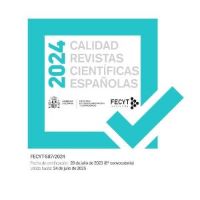




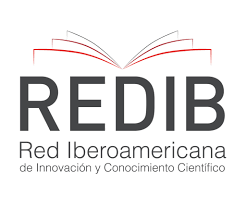
2.jpg)


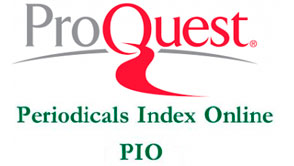
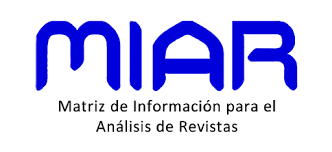



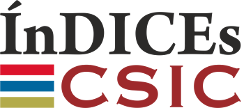



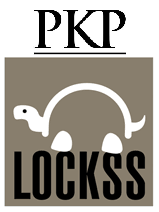
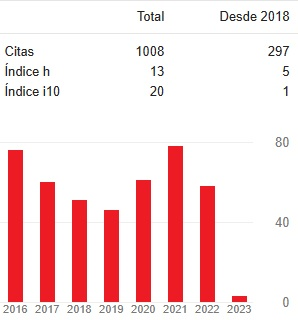



1.png)
1.png)

1.png)


.png)
.png)

.png)
1.png)
1.png)
